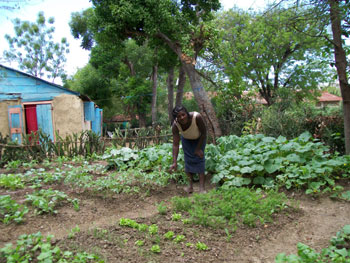Food production has increased, but inequalities threaten food security in the Americas

San Jose, Costa Rica, June 4, 2012 (IICA). Over the last two decades, food production has increased in the Americas overall, but the level of growth has not been equal in all countries and regions, depending on whether they are net food importers or exporters.
Between 1990 and 2010, the Andean, Southern and Central regions reported high growth rates in production, while rates slowed in the Caribbean due to declines in vegetable production and no growth in grain production.
These data are presented in the report “Food Security in the Americas”, prepared by the Inter-American Institute for Cooperation on Agriculture (IICA) at the request of the General Secretariat of the Organization of American States (OAS).
The document will serve as input for the discussions on food security planned for the 42nd OAS General Assembly, which will take place this week in Cochabamba, Bolivia.
Concurrent with the increase in food production, food imports and dependence on international markets have also increased, even outpacing production.
According to IICA specialists, the risks posed by this situation vary; while the Northern and Southern regions can almost guarantee the availability of food for their population, the other regions, but especially the Caribbean, depend heavily on imports.
The report recommends investing more in agriculture, providing incentives for research, extension and technology transfer, strengthening family and small- and medium-scale agriculture and improving access to markets for small- and medium-scale producers.
“We believe that it is imperative to support family and small- and medium-scale agriculture, given its contributions to overall food production and because it generates jobs, increases rural incomes and contributes to alleviating poverty, “said IICA Director General Victor M. Villalobos.
Calm despite risks
Between 1990 and 2010, the countries of Latin America and the Caribbean (LAC) showed steady improvement of the Global Hunger Index (GHI), calculated by the International Food Policy Research Institute (IFPRI).
In general, most of the countries fall into the category of low or moderate food insecurity, but the situation is critical in Haiti, where 58% of the population suffers from undernutrition, while in Bolivia, Guatemala, Nicaragua, Dominican Republic, Ecuador and Panama, at least one in six inhabitants is affected.
Thanks to their International Monetary Reserves (IMR), net food importing regions in LAC are able to finance their imports. In general, the IMR cover between 43 and 98 months of food imports and it is recommended that the period covered be no less than 12 months. However, countries such as Haiti, St. Lucia, Dominican Republic and Nicaragua would have limited liquidity, in an emergency, with which to acquire food on international markets.
In the Caribbean, net food imports account for 2% to 10% of Gross Domestic Product (GDP), making this the most vulnerable region of the hemisphere in terms of international access to food.
In addition to these elements, individual access (food consumption per person) is also affected by factors such as poverty, inequity in the distribution of income and inflationary processes in LAC.
Unhealthy diets, growing levels of obesity and concerns regarding access to potable water, sanitation systems, medical care and agricultural health and food safety services are added to the issues the countries of LAC must address if food security is to become a reality.
The attainment of this goal also depends on the strategies applied by the countries of the hemisphere to adapt agricultural production and agroindustries to climate change, which, in the medium and long terms, threatens the availability of food.
Comprehensive strategies
Given the challenges identified in the IICA report to the OAS, and the fact that one of the Institute’s strategic objectives is to improve the contribution of agriculture to food security, IICA promotes the adoption of comprehensive strategies intended:
1. To increase investment in agriculture in order to develop needed scientific, research, innovation and extension capabilities
2. To develop efficient and transparent agricultural markets
3. To adopt policies and institutional arrangements that promote the integration of small- and medium-scale agriculture into markets
4. To promote free international trade in food
5. To implement programs that provide access to food for vulnerable segments of the population
6. To adapt agriculture to climate change and climate variability, and minimize the risks posed by those phenomena and the volatility of prices for agricultural products
7. To reduce and mitigate the impact of agriculture on the environment, and promote food and nutritional security education programs.
For more information, contact
james.french@iica.int
Full Report - Executive Summary